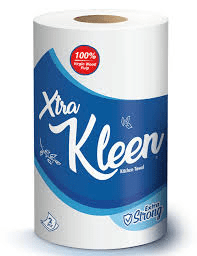Introduction to Kitchen Towel Tissue
Environmental Impact of Traditional Kitchen Towels
Despite their convenience, traditional kitchen towels contribute significantly to environmental degradation. The production process involves the depletion of forests, leading to deforestation and habitat loss. Moreover, the bleaching and chemical treatments involved in manufacturing pose risks to both human health and the environment.
Sustainable Alternatives
In response to growing environmental concerns, sustainable alternatives to traditional kitchen towels have emerged. Bamboo-based kitchen towel tissue and recycled paper options offer eco-friendly alternatives without compromising on quality or performance.
Benefits of Sustainable Kitchen Towel Tissue
The benefits of sustainable kitchen towel tissue extend beyond environmental conservation. By opting for eco-friendly alternatives, consumers contribute to reducing deforestation, minimizing chemical usage, and preserving natural habitats. Additionally, bamboo-based and recycled paper options are biodegradable, further reducing their environmental footprint.
Cost-effectiveness of Sustainable Solutions
Contrary to common misconceptions, sustainable kitchen towel tissue can be cost-effective in the long run. While initial costs may be slightly higher, the durability and absorbency of eco-friendly options translate to long-term savings for consumers. Moreover, the societal costs of environmental degradation far outweigh the monetary investments in sustainable practices.
Consumer Awareness and Education
Promoting consumer awareness and education is crucial in driving the adoption of sustainable kitchen practices. By understanding the environmental impact of their choices, consumers can make informed decisions and actively contribute to positive change. Public campaigns and educational initiatives play a pivotal role in raising awareness and encouraging sustainable behaviors.
Brands and Products
Several leading brands offer sustainable kitchen towel tissue options, catering to the growing demand for eco-friendly alternatives. From bamboo-based products to recycled paper options, consumers have a diverse range of choices to align with their values and preferences.
Practical Tips for Eco-friendly Kitchen Practices
Incorporating eco-friendly kitchen practices goes beyond choosing sustainable products. Proper disposal methods, reducing waste, and optimizing usage can further minimize environmental impact. Simple steps such as air-drying reusable towels and composting organic waste contribute to sustainable living.
Innovations in Sustainable Kitchen Towel Technology
Advancements in sustainable kitchen towel technology continue to drive innovation in the industry. From biodegradable materials to energy-efficient production processes, manufacturers are exploring new avenues to enhance sustainability and reduce environmental footprint.
Social Responsibility and Corporate Initiatives
Corporate sustainability efforts play a crucial role in addressing environmental challenges. Many companies are embracing social responsibility by implementing eco-friendly practices, supporting community initiatives, and advocating for environmental stewardship. By prioritizing sustainability, businesses can create positive impacts on both society and the environment.
Consumer Reviews and Testimonials
Positive consumer experiences with sustainable kitchen towel tissue underscore the efficacy and reliability of eco-friendly alternatives. User feedback and testimonials highlight the satisfaction and confidence that consumers derive from making environmentally conscious choices.
Common Misconceptions
Addressing common misconceptions surrounding sustainable kitchen towel tissue is essential in dispelling doubts and fostering trust among consumers. Contrary to belief, sustainable options offer comparable performance and durability to traditional counterparts while minimizing environmental harm.
Comparative Analysis: Traditional vs. Sustainable Kitchen Towel Tissue
A comparative analysis of traditional and sustainable kitchen towel tissue reveals the superiority of eco-friendly alternatives in terms of performance and environmental impact. From absorbency to biodegradability, sustainable options outshine traditional counterparts in every aspect, making them the preferred choice for environmentally conscious consumers.
Government Regulations and Policies
Government regulations and policies play a pivotal role in promoting sustainability and enforcing compliance standards within the industry. By establishing legal frameworks and incentivizing sustainable practices, policymakers contribute to shaping a more environmentally friendly future.
FAQs
-
Are sustainable kitchen towel tissues as absorbent as traditional ones?
-
Yes, sustainable options are designed to be as absorbent as traditional kitchen towels while minimizing environmental impact.
-
Do sustainable kitchen towel tissues cost more than traditional ones?
-
While initial costs may be slightly higher, the long-term savings and environmental benefits outweigh the upfront investment.
-
Can I compost sustainable kitchen towel tissues?
-
Yes, many sustainable options are biodegradable and suitable for composting, contributing to waste reduction and soil enrichment.
-
Are there any health benefits to using sustainable kitchen towel tissues?
-
Sustainable options are free from harmful chemicals and toxins, promoting a healthier and safer environment for users.
-
How can I encourage my family to adopt sustainable kitchen practices?
Educating your family about the environmental impact of their choices and leading by example can inspire them to embrace sustainable living practices.
Conclusion
In conclusion, the benefits of sustainable kitchen towel tissue are undeniable. By embracing eco-friendly alternatives, consumers can contribute to environmental conservation, protect natural resources, and promote a healthier planet for future generations. It’s time to make conscious choices and embrace sustainable living practices for a brighter and greener future.
